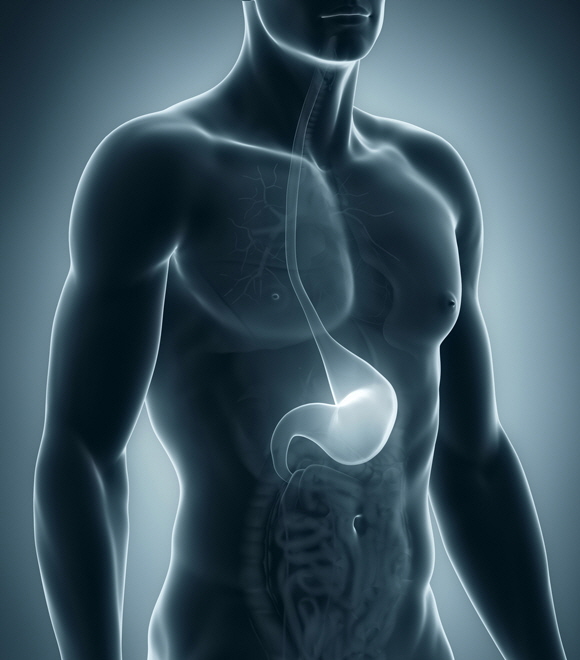

Why should you receive treatment for stomach cancer in AMC?
Stomach cancer is malignant cancer that occurs in the stomach. The most common type is an adenocarcinoma that occurs in the cells of the gastric mucosa. Stomach cancer is infiltrated into the submucosa, muscle layer, and serosa and spread into the surrounding lymph nodes and then other organs, eventually spreading to the whole body. The carcinoma which is confined to the gastric mucosa and submucosa is early stage stomach cancer. The carcinoma that invaded into the muscle layer or serosa or spread to other organs is a progressive stage stomach cancer.
The Stomach Cancer Center holds multidisciplinary meetings such as a weekly conference for stomach cancer and a monthly conference for gastrointestinal stromal tumors (GISTs), where medical professionals discuss complicated cases and review topics. The meetings are used to find the most appropriate diagnosis and treatment methods for patients with stomach cancer and GISTs and apply them to patients as quickly as possible. Also at these conferences, medical professionals have an in-depth discussion on research agendas, cooperating in treatment as well as research projects. Moreover, a multidisciplinary treatment system for outpatients was also established in the Stomach Cancer Center early in 2015 to offer more integrated medical care properly as well as timely. Standard therapies for stomach cancer are well established compared to other organs, so collaborative treatment is not active yet, the number of patients to be treated through the collaboration of specialists in various fields is expected to grow. Currently, a second multidisciplinary team was created to break new ground in collaborative treatment, which cannot be matched by other hospitals. The multidisciplinary integrated treatment system was benchmarked by stomach cancer team of other medical institutions, contributing to the advancement of stomach cancer treatment in Korea.
AMC Stomach Cancer Center is consisted of Korea’s leading medical professionals and performs more than 1,500 surgeries and around 1700 endoscopic therapies a year. Specialists in the fields related to stomach cancer such as stomach surgery, gastroenterology, oncology, radiology, and pathology as well as nurse practitioners always make efforts to improve the results of cancer treatment. The Center offers accurate diagnosis and appropriate treatment for each patient, reports postoperative progress, and performs additional treatment through complementary and coordinated cooperation.
Treatment options

Chemotherapy
Anticancer drugs kill or suppress the proliferation of stomach cancer cells in the following:
- It is used concomitantly to prevent recurrence after surgical removal of stomach cancer
- The stomach cancer that cannot be removed by surgery or reoperation is impossible as it recurred after surgery
- The anticancer drugs are used to reduce the size of carcinoma and remove cancer cells through surgery
In this way, chemotherapy is intended to prevent postoperative recurrence and extend survival rates. AMC Stomach Cancer Center performs adjuvant chemotherapy on stomach cancer after stage two and prescribes oral anticancer drugs solely or in conjunction with injection therapy.

Radiotherapy
Radiotherapy uses a high dose of radiation to destroy cancer cells to reduce lesions of stomach cancer. Radiation has limited effects on stomach cancer, so it is currently applied to treat stomach cancers that cannot be removed by surgery or to suppress pain resulting from recurrent stomach cancer and widen the narrowed part due to the carcinoma.
Surgery
Laparoscopic gastrectomy
Unlike open surgery that makes a 20-30 cm-sized incision in the abdomen, laparoscopic gastrectomy makes five small incisions through which surgical instrument is inserted to remove the carcinoma, leaving almost no surgical scar.
Endoscopic Resection (EMR, ESD)
Early-stage cancer confined to the mucosa can be cured with endoscopic resection rather than gastrectomy. AMC has performed more than 15,000 endoscopic resections since it was introduced in 1995 and treats 800 early-stage cancer patients every year with great results. Moreover, more than 900 patients with premalignant lesions of stomach cancer (adenoma/dysplasia) are treated by endoscopic resection. Its biggest benefit is to conserve the stomach, helping patients to maintain the quality of life.
AMC's treatment performance
Currently, AMC Stomach Cancer Center implements more than 1,900 surgeries for stomach cancer, 100 surgeries for gastric subepithelial tumors, more than 1,500 endoscopic submucosal/mucosal dissections (ESD/EMR), more than 300 endoscopic stentings, and more than 150 endoscopic ultrasound-guided fine needle aspirations (EUS-FNA) a year on average. Adjuvant chemotherapy and palliative chemotherapy are performed on 370 patients and 400 patients, respectively every year. Such accumulated experience supports AMC to take the lead in treatment of gastric cancer.
AMC Stomach Cancer Center has performed 6,100 laparoscopic surgeries with the highest cure rates of 95% and is one of four medical centers capable of performing an intracorporeal anastomosis (an approach of connecting the remaining organs in the body without taking them out) in conjunction with laparoscopic surgery. Unlike extracorporeal anastomosis, laparoscopic surgery combined with intracorporeal anastomosis minimize the manipulation of the gastrointestinal tract and the size of a surgical scar, bringing a lot of benefits such as the faster recovery of gastrointestinal function, early ambulation due to lessened pain, cosmetic effects, and a short hospital stay.
- More than 1,500 cases of laparoscopic resection a year on average
- More than 300 cases of stenting a year on average
- More than 1,500 cases of surgery for stomach cancer a year on average
